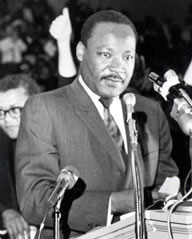 Just a few days ago, Jeh C. Johnson, general counsel for the Department of Defense, gave a speech at the Pentagon in recognition of Martin Luther King Day. Toward the end of his talk, Johnson mused about what the non-violent preacher, a man who railed ceaselessly against the Vietnam War, would feel about our ongoing operations in Iraq and Afghanistan were he alive today.
Just a few days ago, Jeh C. Johnson, general counsel for the Department of Defense, gave a speech at the Pentagon in recognition of Martin Luther King Day. Toward the end of his talk, Johnson mused about what the non-violent preacher, a man who railed ceaselessly against the Vietnam War, would feel about our ongoing operations in Iraq and Afghanistan were he alive today.
It is hard to imagine a more wrong-headed analysis of Rev. King’s philosophy of non-violence. After correctly noting King’s unwavering stand against the Vietnam War, Johnson loses his way. Quoting from the “I’ve been to the mountaintop” speech given the day before King was assassinated, Johnson mistakenly likens King’s reference to the compassionate aid of the Good Samaritan to the Shock and Awe of a mighty armed force. He equates giving aid to waging war.
It would be charitable to assume Johnson was being sensitive to his military audience and ignorant of history. More likely he was willfully changing the past to justify the present.
Whatever your opinion of America’s War on Terror, our military deserves better. Shame on Mr. Johnson.
* * * * *
I include the relevant portions of Johnson’s talk below, but first, an impassioned take on this issue.
[youtube ahI8o9-U7Z0 nolink]
* * * * *
Excerpts:
[T]he most controversial and difficult stand Dr. King took the final year of his life was against the war in Vietnam. Other civil rights leaders urged him to remain silent on the issue, not to alienate President Lyndon Johnson, who had been their best friend on civil rights. Martin Luther King hated violence. He believed that violence “is a descending spiral, begetting the very thing it seeks to destroy,” and that “returning violence for violence multiples violence, adding deeper darkness to a night already devoid of stars . . . He also believed “an eye for eye leaves everybody blind.” So, beginning in April 1967, one year before he died, Dr. King, the Nobel Peace Prize winner, turned this message into an impassioned plea against the war in Vietnam. Indeed, from that point on he questioned the whole rationale for war in general. From the gospel song “Down by the Riverside,” Dr. King repeated the line: “I Ain’t Gonna Study War No More.”
I believe that if Dr. King were alive today, he would recognize that we live in a complicated world, and that our Nation’s military should not and cannot lay down its arms and leave the American people vulnerable to terrorist attack.
To our individual servicemen and women who wonder whether their mission is consistent with Martin Luther King’s own message and beliefs, I refer you again to his very last speech in Memphis, the night before he died. In it Dr. King talked about Jesus’ parable of the Good Samaritan on the dangerous road to Jericho. With great effect Dr. King drew a parallel between the priest and the Levite who passed by the man on the road to Jericho, beaten and robbed and in need of aid, and failed to help him, and those in Memphis in April 1968 who hesitated to help the striking sanitation workers because they feared for their own jobs, for their own comfortable positions in the Memphis community. He criticized those who are “compassionate by proxy,” and said to those in the audience in Memphis that night, “The question is not, if I stop to help this man in need, what will happen to me? The question is, if I do not {{stop the}}[[stop the]]Mr. Johnson meant to say “stop to help the”[[stop the]] sanitation workers, what will happen to them.”
In 2011, I draw the parallel to our own servicemen and women, deployed in Iraq and Afghanistan and elsewhere, away from the comfort of conventional jobs, their families and their homes. Those in today’s volunteer Army, Navy, Air Force, and Marine Corps have made the conscious decision to travel a dangerous road, and personally stop and administer aid to those who want peace, freedom and a better place in Iraq, in Afghanistan, and in defense of the American people. Every day our servicemen and women practice that “dangerous unselfishness”
* * * * *
Rev. King’s actual words were: The question is not, “If I stop to help this man in need, what will happen to me?” “If I do not stop to help the sanitation workers, what will happen to them?” That’s the question.





